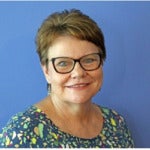 The Better Arguments Project is a national civic initiative created to help bridge divides—not by papering over those divides but by helping people have better arguments. Arguments don’t have to drive us apart; better arguments can bring us together. Helga Penner participated in the Better Arguments Ambassador Program, an immersive, fellowship-style program designed to equip participants to bring the project to their communities. Helga sat down with the Better Arguments team to share how she applied her learnings in the context of her church community in Baltimore, Maryland.
The Better Arguments Project is a national civic initiative created to help bridge divides—not by papering over those divides but by helping people have better arguments. Arguments don’t have to drive us apart; better arguments can bring us together. Helga Penner participated in the Better Arguments Ambassador Program, an immersive, fellowship-style program designed to equip participants to bring the project to their communities. Helga sat down with the Better Arguments team to share how she applied her learnings in the context of her church community in Baltimore, Maryland.
Could you tell us a bit about yourself and why you were drawn to the Better Arguments Ambassador Program?
I live in Baltimore, and I worked for Allstate for 37 years in the claim department. Allstate is one of the partners of the Better Arguments Project and that’s how I was introduced to the program.
It’s disheartening how people have become so polarized, and I’ve always had this idea that it’s hard to hate people up close. I believe that when you talk to people individually, you get to know them in a truer sense, so the whole idea of trying to talk about things honestly and seeing where people are coming from really resonated with me.
As I was getting ready to retire, I thought this would be a good thing for me to get involved in during my early months of retirement. I knew that I wanted to apply my learnings in the context of my church, Zion Lutheran Church in downtown Baltimore, because we are at a crossroads as to what our future looks like. There’s been a call for us to get more involved in the broader community outside our walls. There seems to be something that holds us back from engaging more in our downtown community, so I thought that the Better Arguments approach could help us move forward.
Can you share what it was like having a better argument in your church community?
Our church is right in the heart of downtown Baltimore, yet we continue to be inwardly focused on our immediate church community, despite being in this perfect location to be able to address the needs of the surrounding community. It’s important to me personally that we do more to invite the public in and to create avenues to serve them both because it’s part of the call of Christian service and because it’s just the right thing to do. I wanted to bring my church together for this difficult conversation about the path forward.
When I convened our church leadership for my Better Argument, I started them off by asking what they value about Zion Lutheran Church. This helped acclimate the group and push them to get to know each other in a deeper way. I then introduced everyone to the Three Dimensions and Five Principles of a Better Argument to set norms for the discussion ahead, with a real emphasis on active and empathetic listening skills.
Next, I introduced discussion questions and set people off into their small groups for the real heart of the conversation, purposefully placing some quieter individuals with more talkative ones. And after the small groups, we came back together as a full group to share out. I instructed groups to share what they saw as Zion’s purpose and what specific engagement strategies they had considered. I was gratified to hear the honesty and creativity that came out of the conversation. One of the participants observed that one of the photos of the church we’ve used on our website and social media is beautiful and yet, the gates are closed and that may send the message that we are fencing ourselves off and not inviting people in. I think this was a real moment of revelation for others in the group about how the broader community might view Zion.
One of the things that I love about working in the Better Arguments Project is that people come to us with very different angles—some people come focused on polarization and others come focused on equity. With your focus on community building, what do you see as the relationship between having Better Arguments and being able to build a robust local community?
One quote that was brought up in our training was from Priya Parker: “Human connection is as threatened by unhealthy peace as by unhealthy conflict.” In our congregation, I feel that there is this unspoken tension between people who are focused on wanting to serve the community and get outside our walls and others who are reluctant to do that.
Something that came out in our conversation was that there are people in our congregation who come in from the suburbs and are less comfortable engaging with the urban community. I felt like the Better Arguments approach provided a setting where people could express those hesitations and talk through those fears in a way where they would not feel judged. We were then able to get those feelings on the table and unpack them together.
In your context, what aspects of the Better Arguments framework (the Five Principles and Three Dimensions) proved to be most salient, or which parts were most important for creating that nonjudgmental space that you referenced?
For me, it was the Second Principle of a Better Argument: Prioritize Relationships and Listen Passionately. I was very drawn to that and spent time talking about the different types of listening when I presented the principles in the meeting. It was important that we actually listened at a level where we are really hearing what the other person is saying, and not just thinking about what we’re going to say next to respond to them or challenge them.
What sort of impact did you observe in people by showing them that it’s possible to come together and disagree in more constructive ways? And what do you see as the next steps following this conversation?
I think that people left feeling that they had been heard, but also feeling more hopeful, which was encouraging to see because sometimes there’s a bit of negative energy and anxiety about our future.
By having an event like this in the congregation, people are introduced to a new way of talking about issues. What I’m hoping is that through the practice of having better arguments, we can create cultural change in our community. I’m hoping to expand on my initial convening to invite the rest of the congregation into the discussion as well. I hope that it will resonate with people and that there will be others in the congregation who can embody and represent the values associated with having better arguments.
The Better Arguments Project is a partnership between the Aspen Institute Citizenship and American Identity Program, Facing History and Ourselves, and Allstate. To learn more, visit betterarguments.org.

